Without the speech of Zelenskyi and yellow-blue bears: Ukraine at Berlinale 2024 – Publications
[ad_1]
The 74th Berlin International Film Festival – one of the three main film events in Europe – will start on the evening of February 15.
Compared to the previous year, the focus of the festival is not on Ukraine this time, and the list of premieres that were shot in Ukraine or that talk about us has decreased. A total of five such films are presented in different sections of the film festival. A Ukrainian writer also joined the international jury Oksana Zabuzhko.
A full-length feature film will be presented at the Forum section Roman Bondarchuk “Editorial” and documentary Oksana Karpovich “Peaceful people” (“Intercepted”). Documentary work will be shown in the Panorama Dokumente category Svetlana Lishchynska “A little strange”. And in the competition of films for and about teenagers Generation 14plus will show the short work “Image” by an American of Ukrainian origin Hleba Osatynski.
On the eve of the premiere, a film reviewer UP. Culture Elizaveta Sushko talked to Ukrainian directors who brought their films to the Berlinale.
“Editorial Office” / The Editorial Office, dir. Roman Bondarchuk
A frame from the film “Redaction”
The director’s second full-length feature film “Volcano”, and the second – about his native Kherson region, shot on the eve of the full-scale invasion and occupation, which only exacerbates its perception today.
The tape tells about the journalist Yura, who, due to his idealistic views, strives for justice in everything. He lives in Kherson, elections are on the horizon, and Yura does not want to write about the pre-election promises of a candidate who is in a coma, or about the installation of a fake gas pipeline.
He wants to change the situation with the burning of forests and to film the red book marmot so that the Oleshkiv forests are protected by Europe. But working in a regional newspaper can easily drag you into a maelstrom of fake news and corruption schemes.
“The film, in particular, is about post-truth, fakes, information manipulation using the example of the work of the provincial editorial office. We are investigating the mechanics of this phenomenon, which has become global.” – says the film’s director Roman Bondarchuk. And continues:
“Populism, promises of simple solutions bring irresponsible and dangerous politicians to power in many countries. In our film, politicians look mostly funny, and the funny immediately ceases to be scary. I believe that this story is universal, which, regardless of the nationality of the viewer, will cause recognition, smile and enable critical thinking.
This story can inspire early detection of IPSO and will encourage people not to rush to spread misinformation or overly emotional news without first checking it with several sources. I would like the main characters of the film, who are fighting for the truth (despite being in the minority) to be associated with Ukraine now, making us closer to the Western world.”.
The “Editorial” team promises to rent the film in Ukraine this fall. At the Berlinale, it will be shown only with subtitles. Roman says that the audience will feel the southern Ukrainian flavor to the fullest:
“Our viewers will be able to watch the film without translation, and therefore feel more meaning, more humor, maybe recognize real people who our characters look like. Of course, I want changes in our political culture. So that reputation matters. So that voters understand the connection between “we live badly” and “voted for buckwheat”. So that slogans and pictures on billboards, finally, do not let the eyes bleed. So that the magical thinking that “everything will somehow work itself out” is changed to a willingness to take responsibility for oneself.
“A bit of a Stranger” / A bit of a Stranger, dir. Svitlana Lishchynska
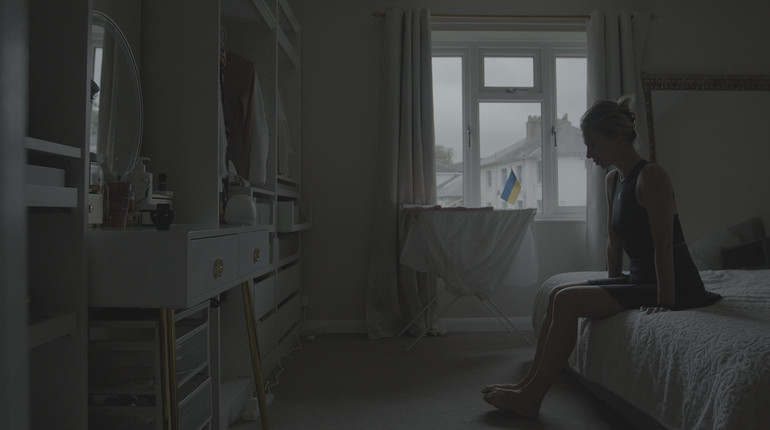
A frame from the movie “A Little Stranger”
The documentary film about the Russified Mariupol tells the personal story of the director and her closest relatives — a mother, a daughter and a young granddaughter. They speak Russian, love their native Mariupol and have many injuries, resentments and questions for themselves and each other. Their world turns upside down on February 24, and the film becomes an exploration of identity choices – from childhood to adulthood.
“Many films are being made now about the war between Russia and Ukraine. This is what hurts us, Ukrainians, the most, and causes sympathy and a desire to help most of our foreign friends,” — the producer of the tape told for UP.Kultura Anna Kapustina. And he adds that this film is not only about war:
“We would like the international audience to understand a little more about the nature of this war through the story of a family from Mariupol, the family of the director, Svetlana Lishchynska. After all, our film is not about war. Rather, it is about human destinies, about how first the Soviet and then the Russian propaganda overshadowed people’s sense of national belonging, identification, trying to replace them with pride for belonging to a forcibly created “great state”.
The older generation of the heroines of our film, together with the entire Ukrainian society, is going through a difficult path of transformation from a Soviet person to a citizen of an independent country, to the perception of oneself as a Ukrainian. The Russians will not understand this, but we want it to be understood by the international audience.”
“Peaceful people” / Intercepted, dir. Oksana Karpovych
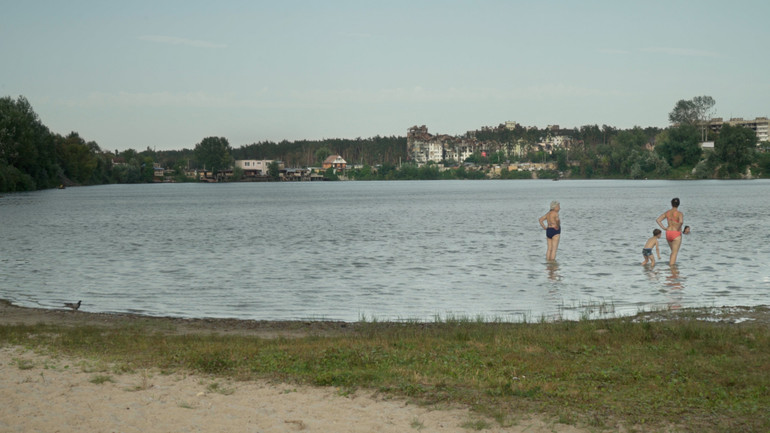
A frame from the movie “Peaceful People”
Another documentary shows two parallel worlds – Ukrainian destroyed villages, cities, houses and highways after their de-occupation in unhurried shots, and the audio accompaniment works as a counterpoint. The viewer will hear recordings of phone conversations intercepted in 2022 by the Ukrainian special service between Russian soldiers in the trenches in Ukraine and their families. It is difficult to determine which element is more devastating: the soldiers’ confessions of rape and brutal torture of Ukrainian civilians and prisoners of war or the (mostly) female voices from “home” testifying to chauvinism and hatred, misinformation and schizophrenic propaganda.
The film becomes an immersive experience and makes you think about the motivation of people who come to another country to wage war. And the abyss of destruction seems like landscapes that normalize horror.
“Our film is complex and multi-layered, but I will allow myself to roughly condense its content as follows: Russia is an imperial terrorist state with elements of fascism. It uses violence as the main tool of politics, both domestic and foreign. One of the biggest tragedies of the Russian invasion of Ukraine is that the majority of Russian citizens support it. It is because of this that this invasion is possible. Our film aims to show the scale of dehumanization of Russian society and challenges the Western narrative of “Putin’s war”, which places responsibility for the crimes committed solely on the Russian leadership. But our film does one more thing: it shows the incredible effort of Ukrainian society, ordinary people, to resist the horror of war and fight for the right to a normal life,” says director Oksana Karpovych.
“Resentment” / Resentment, dir. Hleb Osatinsky
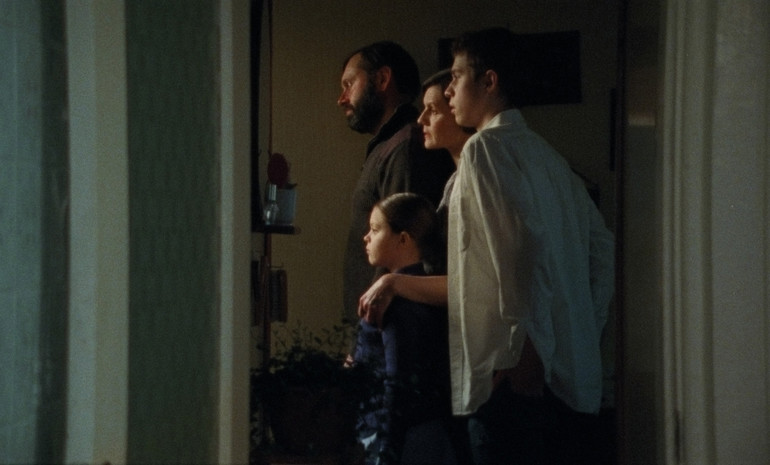
A frame from the movie “Insult”
In the last few years, stories about the 90s have increased in Ukrainian cinema. And while we are waiting for the long-awaited release of Iryna Tsylyk’s film “Me and Felix”, actor Vladyslav Balyuk played another teenager of that time. But this time in a short film by a director of Ukrainian origin who emigrated to the USA in 1994. His film “Image”, which will premiere at the Berlinale, is a personal story based on memories of post-Soviet Ukraine.
The main character Yasha rebels against the authorities. He gets into trouble at school for playing the wrong music. But he is reproached not only for his bad behavior, but also for his Jewishness. This is not surprising, but causes a violent reaction in the 17-year-old boy. And when his father rejects the idea of emigrating to New York, Yasha burns all bridges and embarks on a journey that will lead him to the abyss of irreparable damage.
“Turn in the Wound” / Turn in the Wound, dir. Abel Ferrara
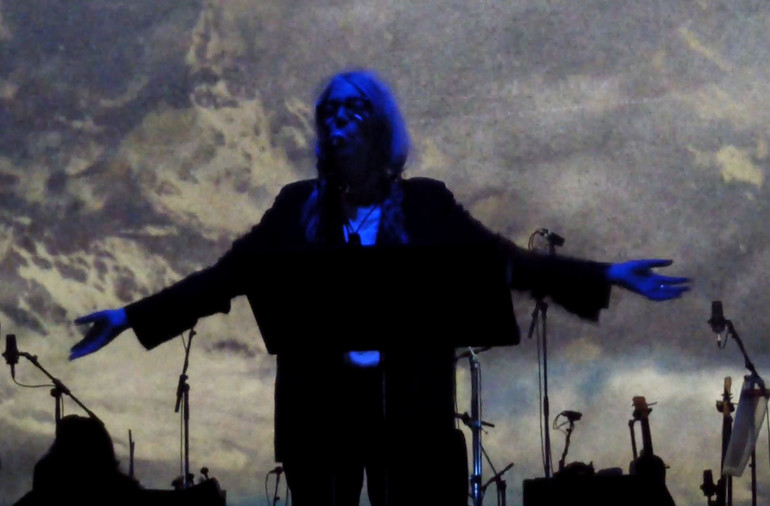
Patti Smith
A frame from the film
The most unexpected find in the program looks like a continuation of the tradition. Last year, the premiere of Sean Pen’s documentary about Ukrainian President Volodymyr Zelenskyi “Superforce” took place at the Berlinale. But this year, the festival programmers went even further and added a film about art and the Ukrainian government to the program.
The performance film of the American director and screenwriter of low-budget mainstream films (“Bad Lieutenant”) tells about the eternal search for freedom in the face of oppression and military force. The voice of the “godmother of punk rock” Patti Smith, who recites the works of Artaud, Domal and Rimbaud, joins the words of soldiers and people living in the war zone of Ukraine and its President Volodymyr Zelenskyi.
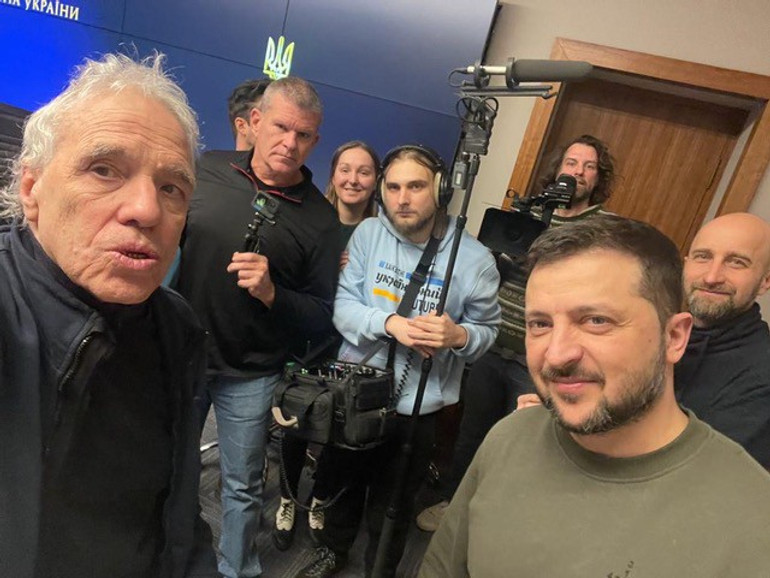
Abel Ferrara and Volodymyr Zelenskyi on the set
[ad_2]
Original Source Link











